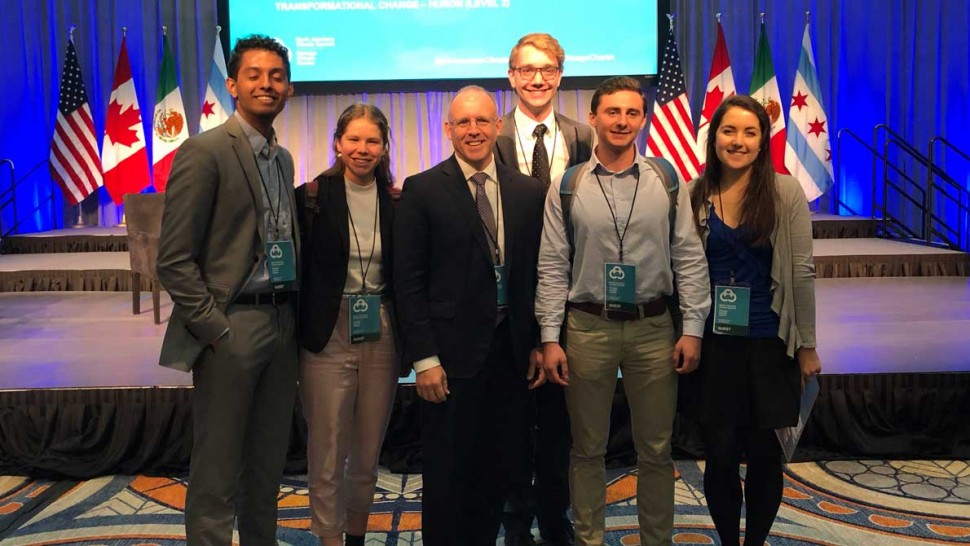CHICAGO - Underscoring its commitment to mitigating climate change through experiential learning, a handful of Northwestern University students who lead on-campus energy and sustainability initiatives joined the Institute for Sustainability and Energy at Northwestern (ISEN) to mingle with municipal leaders from around the world Tuesday at the Northern American Climate Summit in Chicago.
Hosted by Chicago Mayor Rahm Emanuel and the Global Covenant of Mayors for Climate and Energy, the 2017 summit brought together mayors from 51 cities -- from Paris to Phoenix, Vancouver, Canada, to Guadalajara, Mexico, and many in between. The mayors signed the historic Chicago Climate Charter, which details concrete commitments to meeting or exceeding greenhouse gas-reduction goals from the Paris Climate Agreement.
Northwestern has made similar robust commitments to reducing its carbon footprint, detailed in the University’s recently-announced Strategic Sustainability Plan (2017-2021). ISEN plays an integral role in achieving one of the plan’s pillars -- preparing the next generation of leaders to solve the climate crisis -- through interdisciplinary research and education.
ISEN’s mission and approach also align with a formal pledge in the Chicago Climate Charter, in which signatories promise to “Partner with scientific and academic experts … to develop holistic climate mitigation, adaptation and resilience solutions.”
“ISEN works to build integrated teams that cut across science, engineering, policy, journalism and business to advance innovative energy and sustainability solutions,” said ISEN Managing Director Demetria Giannisis, who attended the summit. “Connecting University researchers to local and global corporate, civic and nonprofit partners accelerates the scope and scale of what we can achieve. It’s inspiring to see municipal leaders make such resolute and public commitments to address the impacts of climate change.”
Students were treated to panel discussions and presentations by climate leaders including former President Barack Obama, whose administration was a driving force behind the Paris agreement. This year’s summit addressed head-on the Trump administration’s vow to withdraw from the agreement and the consequent need cities and their leaders see to act as climate leaders.
“The chance to attend the Chicago Climate Summit was invaluable,” said Jonathan Pfluger, a materials science and engineering Ph.D. candidate at Northwestern’s McCormick School of Engineering. “Seeing so many local leaders, mayors and their staff members was inspiring at a time when U.S. federal leadership in sustainability seems tenuous at best.
“Beyond getting a picture with Mayor Emmanuel and a chance to be a mere 50 feet from former President Obama, these memories will be cherished for the rest of my life. From quippy one-liners to the opportunity to have personal conversations with large city mayors like Bill Peduto from Pittsburgh and Ed Lee from San Francisco, and watching 51 city mayors sign the Chicago Climate Charter, this experience has left an indelible mark on my professional path.”
 McCormick Ph.D. candidate Jonathan Pfluger poses with Chicago Mayor Rahm
McCormick Ph.D. candidate Jonathan Pfluger poses with Chicago Mayor Rahm
Emmanuel at the North American Climate Summit on Dec. 5 in Chicago.
---
Northwestern’s sustainability plan lays the groundwork for achieving net-zero emissions by 2050, with a short-term goal of reducing energy consumption from 2010 levels by 20 percent by 2020.
“As a leading global institution, Northwestern is committed to mitigating the impact of climate change,” President Morton Schapiro said about the sustainability plan’s release. “We have an obligation to future generations to reduce our carbon footprint, yes -- but also a tremendous opportunity to contribute to global climate solutions.”
In June, Schapiro signed the “We Are Still In” Declaration, an open letter committing signatories to meeting Paris climate goals. Since its June release, more than 2,500 leaders from municipal and state governments, corporations, non-profits, colleges and other organizations -- representing more than 130 million Americans and $6.2 trillion of the U.S. economy -- have signed the declaration, according to its website.
As with signatories to the Chicago Climate Charter, the University is accurately quantifying, tracking and publicly reporting its emissions “consistent with standards and best practices of measurement and transparency.” The University uses the U.S. Environmental Protection Agency’s ENERGY STAR Portfolio Manager to track all of its energy use and voluntarily provides access to that data to EPA, the U.S. Department of Energy and the cities of Chicago and Evanston.
Toward that end, Northwestern recently completed its first comprehensive Greenhouse Gas Emissions Assessment to establish a baseline for accurate tracking and reporting of progress.
To learn more about sustainability and energy at Northwestern, see ISEN’s recent edition of its magazine, “Empower,” or visit the website of sustainNU, the University’s campus-wide program to engage students, faculty and staff in sustainable living.


